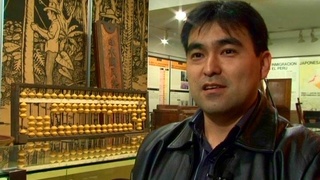Interviews
Differences between American and Japanese taiko
1985, Tsukuba World Expo, I represent as United States for NHK interview. So, [they] said, “Tanaka Sensei, how you feel [about] Japanese taiko? Wah, wah, wah…” First thing I said, “They play nice taiko. Good costume.” That time, Japanese economy, economic is very good, so they spend, you know. But the American taiko group, they make their drums themselves and the costume themselves. So American taiko group [is] not as fancy as Japanese taiko group, but American taiko group has more spirit, more appreciation because they made their drums themselves, so they take care drum good. But Japanese group—town or city—they are budget they buy the nice drum. So please beat taiko. I think spoiled. That’s what I said.
So for American-born Japanese to play taiko is not only fun, but through taiko or beat taiko, they express themselves—their identity. I’m not Sansei, so I can’t exactly represent their feeling. But to make a group here and to make a taiko group in Japan…totally different. I think United States people is more down to earth, down to earth. Even though taiko shape not good as expensive taiko, but values—sense of values is different. That’s [what] I told 20 years ago.
Date: January 27, 2005
Location: California, US
Interviewer: Art Hansen, Sojin Kim
Contributed by: Watase Media Arts Center, Japanese American National Museum.









